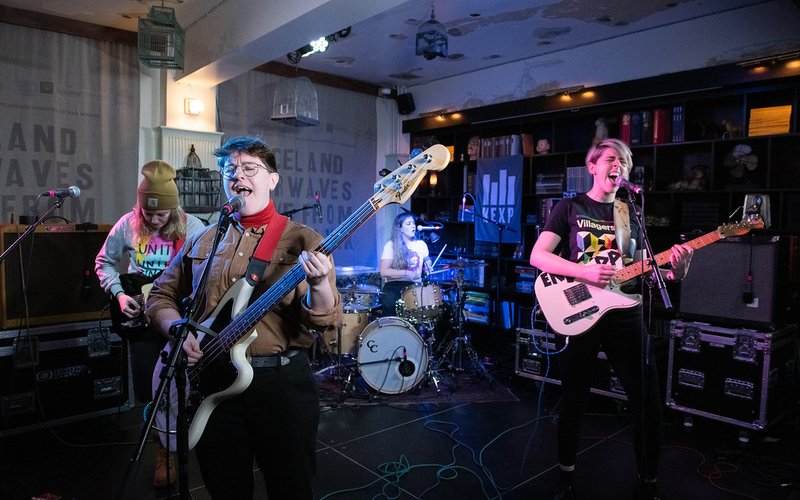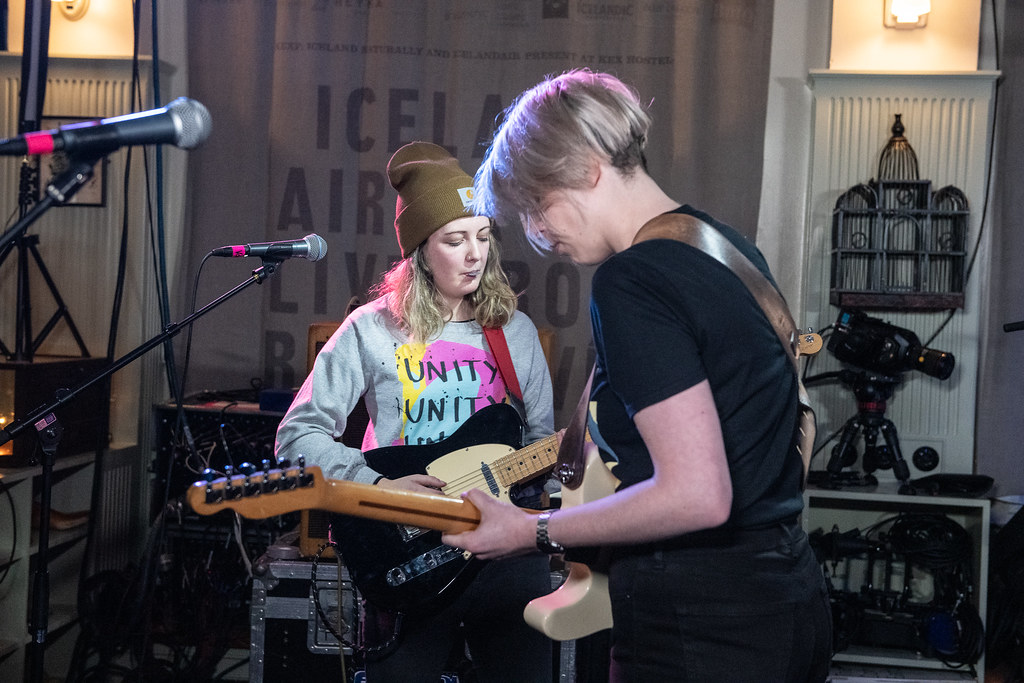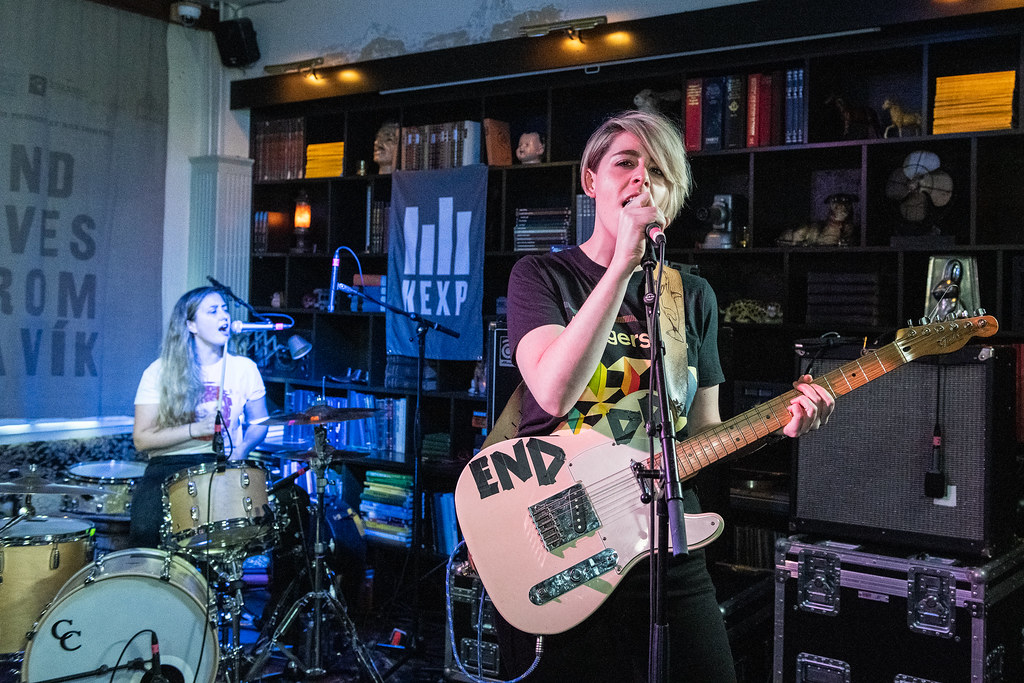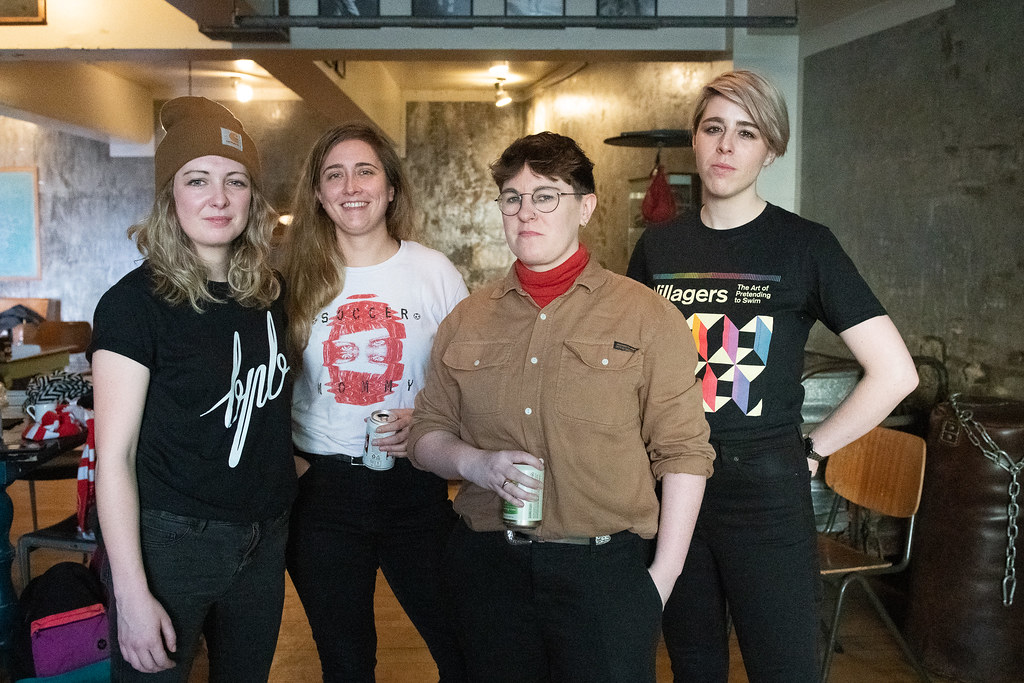
Dublin’s Pillow Queens write songs that hit like an elbow to the gut, each a harder jab than the last. It’s been that way since the quartet dropped their first EP, Calm Girls in 2016. While they certainly have their raucous and rowdy moments, it’s the emotional core of the songs that leaves the most sting. Resonant and rapturous, the band finds a way to channel their thoughts on the world around them through precision indie rock songwriting that builds into swelling, cathartic choruses.
When the band played at the Kex Hostel at Iceland Airwaves, that heart at the core of their music resounded through the halls of the venue. Songs tackle religion, sexuality, and the everyday struggles of making through an anxious world. On stage, their guitars were brandished with tape spelling out the words “End DP” – a call against Ireland’s unjust Direct Provision system for refugees and asylum seekers. All of these factors coming together show a band willing to ask big questions. And listening to their 2019 EP State of the State, it’s clear they know how to do this with expert riffs and tight, unimpeachable songcraft.
After their set, we caught up with the band to learn about their origins, the Irish music scene, and how they use their music to express their identity as well as fighting for social change. Read the interview and watch the video from their performance below.
KEXP: Tell me a little bit about how the band started and how you all came together.
Sarah Corcoran: So we have a story about how we met on a basketball court. It's about 60 percent true, which is enough to make it true. Myself and Cathy met on a basketball court around the time that we started the band. So it kind of is true. But Pamela knew Rachel and Cathy for like 10 years. I've known you for like six years or seven years or something like that. So we all kind of knew each other through each other. We just wanted to start a band because we'd all do musical projects before and we were sort of ready to start something new. We wanted to be in a band that toured. We wanted to be in a band that recorded and we wanted to just take it a bit more seriously. Everyone was on the same level so we just decided, "let's do it". So we've been nonstop since we started everything, which is great.
You were all in bands before forming Pillow Queens. What's the Irish music scene and community like?
Pamela Connolly: It's amazing. I guess maybe when we were all in bands, it was a little bit before it became as good as it is now. Most of us were in bands during the recession. So it was good, but people would get taken advantage of a lot. But now the scene – not even just Dublin, all around Ireland – is amazing. The scene coming out of Limerick is class. And it's not just guitar music. It's hip-hop. It's R&B. There's a revival with trad and lovely folk music as well. The scene is really strong and people are taken a lot more seriously now being from Ireland. I hope it keeps going that way and it just gets better. But I highly recommend [to] look up as many Irish bands as you can because they're all pretty good. We're only OK [laughs].
Corcoran: Irish bands really support each other at the moment, which is really nice. I mean, maybe that's always been the case, but definitely, from our experience of being in Pillow Queens, we've received support from bands of every genre on touring, recording, on just getting local gigs. One of the guys from Bitch Falcon lent me a bass for this session because my bass is terrible and I can't afford to buy a new one. So I was like, "Can I borrow a bass?" And he was like, "Yeah, absolutely!" Just gave me his bass for this.
Sarah Corcoran: mean, writing is always cathartic anyway. So you can put your worries into a song and then it's just like boxing them up and not dealing with them [laughs].

Queer identity seems to come through in a lot of your music. Pretty directly in songs like "Gay Girls." Is it important for you to share that perspective in your music?
Connolly: And yes and no. I think it's it's hard to not because it's so much a part of your identity that when you're writing it just comes out anyway. Then someone may ask you a question like, 'Oh, you're really trying to protect your career identity.' I'm actually not. I'm just writing the way maybe a straight man would write about his experiences, I'll write about mine. We'll write about ours. So it's not at the forefront of our mind, but we do know that it's important. But I don't think it's a thing that's always on the table. It just happens. It's not conscious. And I like it that way because I think if we were trying too hard it would come across that way. I like casual queerness [laughs].
Corcoran: I think as well, a song like "Gay Girls," the title would make you think that it's a song about queerness, but it's only really on the very cusp of being a queer song. The title, obviously, but it's more a comment on religion and that sort of thing. I mean, the wringing hand imagery is like... We can't help but write about religious things. We all were brought up in very religious environments so it always comes out. And because I suppose queer themes are so contradictory maybe of like religious themes, maybe that's where the juxtaposition happens.

I noticed during your set you had the words “End DP” taped on your guitars, which I assume refers to direct provision. Could you talk a little bit about what it is for people in our audience who might not be familiar with that? And also, do you see music as a vehicle for social change?
Corcoran: So direct provision is basically like – [this is] a casual answer – but it's like a purgatory for refugees in Ireland. It's like centers for refugees to come in and there's very... basic human rights, if even…
Connolly: The Taoiseach thinks it's that it's OK in terms of human rights. The fact that he has to be like, 'I think it is' means that maybe it's not. You know. So it does very little freedom for them in terms of just interacting within our society at all. They're given very little money, very little... just the freedom to make their own food, they don't have. It's something that's getting more and more prevalent in Ireland and they're not really doing anything about it.
Corcoran: It's definitely not the top of anyone's priority list in the government and it's really stressful that that's the case because it's something that we need to just end immediately. People's human rights are being violated on its unfair. Just welcomed people into the community. Why wouldn't you? It doesn't make any sense. And in terms of music being a vehicle for change, I think because there's a great community in Irish music at the moment, it helps to rally together about certain things. We recently had a referendum on legalizing abortion in Ireland and prior to that, we had a referendum on gay marriage equality. Within that, we did like a lot of fundraisers, campaigning and that kind of thing. Definitely, the music scene was very just active in that, I suppose. I do think music is a vehicle for change for sure. It just makes people more aware of things that maybe they weren't. We use our stage as a platform, sometimes, to just make people aware of things they might not usually be aware of.
You just released a great new song called "Brothers," which you've described as being about mourning and also intense love for your chosen family. Can you tell me a little about the inspiration behind that song?
ConnollyYeah, it's kind of about when you lose a friend and you have like a tight-knit group of friends around you who also lost that friend and the kind of an intense emotion between all of you that happens in the aftermath of that and how much you appreciate the people around you and fear what's going to happen to them and or what's going to happen to yourself. It's kind of a little flash moment of about that. Sorry if I'm not being very specific.
Corcoran: I think as well, like oftentimes because we're out-and-out feminists, obviously, and sometimes that can be confused with not appreciating men. So it's kind of a song that's about celebrating the man in your life. We all have men in our lives that we love to bits. So I think it's important to celebrate that, too.
It sounds like there will be a new album next year. What can we expect from that and what type of ideas are you looking to explore on the record?
Corcoran: I think there are no specific threads that really run through. I mean, other than the obvious ones that just reflect our immediate identity that we can't run away from. We're writing a lot at the moment and it feels like the right time to put out an album because we just want to capture this moment in us as a band and not just run away with ourselves. So we want this to be our first release. There's going to be very few old songs on it and they're gonna be a lot of new songs that have been written very, very recently finished. We're going into the studio with mostly formed ideas, but that can also take a new shape. So we're excited about that. But you know, it just feels like the right time to put out an album.

Watch Marie Ulven's performance from Iceland Airwaves 2019 and read an interview.
Watch the band's performance from Iceland Airwaves 2019.
Watch the Icelandic composer's performance at Kex Hostel in Reykjavik, Iceland for Iceland Airwaves 2019.